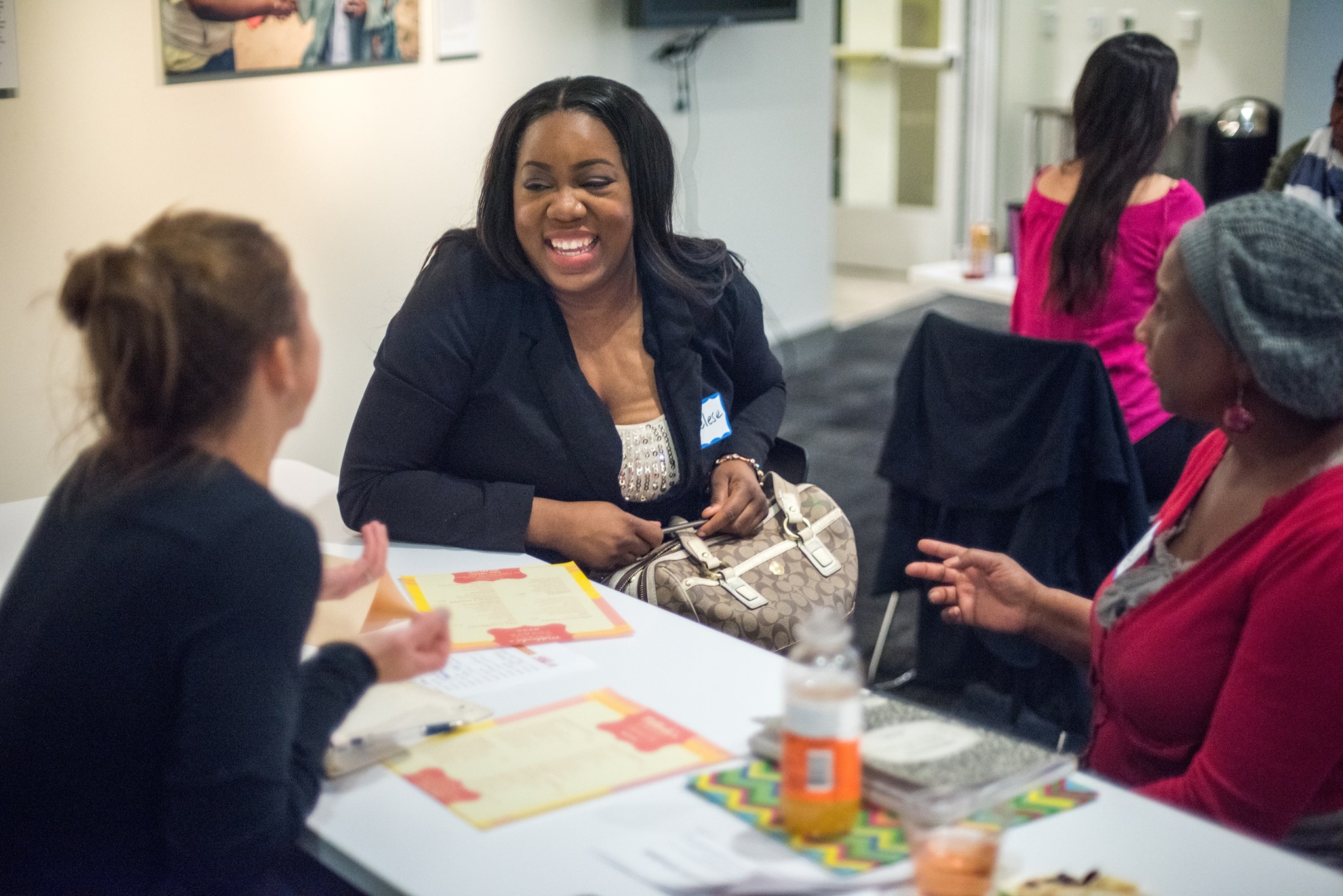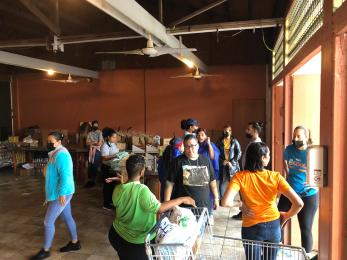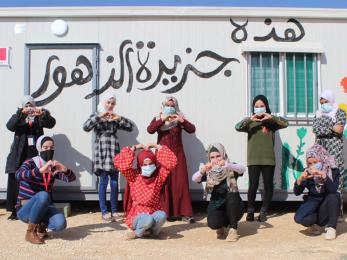Community first: Black entrepreneurs show us what’s possible

Across the United States, small businesses are aching as COVID‑19 closures, costly safety regulations, and a thinning customer base poses them with the question of whether or not they’ll make it. In a year that housed a pandemic, racial justice uprisings, and limited in-person commerce – navigating a path forward has tested every aspect of the status quo.
Black-owned businesses are familiar to these challenges, and many more. Despite the hurdles, Black entrepreneurs show us what’s possible for local communities – illustrating craft, perseverance, and the power of humanity. In honor of Black History Month, we’re celebrating three Black entrepreneurs in our Mercy Corps Northwest community who continue to lead the way.
Earl Lancaster of Seattle’s Earl’s Styles and Cuts
Old redlining maps of Seattle’s downtown districts paint a picture that mirrors rising rent costs and displacement. For many small business owners, years of development atop closures from the pandemic have amounted to shuttered doors and beloved shops disappearing from neighborhoods.
But for other business owners, like Earl Lancaster, their business’s continued success marks an unwavering dedication to their community – and their community’s dedication to them.

Earl Lancaster purchased his barber shop, now known as Earl’s Cuts and Styles, when he was just 22 years old. For him, the journey from barber to business owner happened in the blink of an eye.
After graduating from high school in 1986, Earl enrolled in cosmetology school. He jokes that he had intended on registering for barber school but the option didn’t exist at the time. On his graduation day he landed a job at the local Gary Ladd’s barber shop, owned by a classmate’s father of the same name. Gary saw Earl’s potential early on. After four short years, he handed him the shop and Earl’s small business was born.
Located in Seattle’s Central District, Earl’s barber shop is a neighborhood staple. His business offers second chance hiring, summer jobs sweeping the shop’s floor, and a familiar place for his long-term clients to now take their sons. The shop has helped locals land jobs, earn relationship advice – and allowed them space to both vent and listen.
“I’m proud to show the community, the younger men – or men period – that you can be successful if you put your energy into it,” shared Earl.
“I’ve heard mothers, grandmothers, and clients say ‘Why don’t you just be like Earl? Why don’t you get a little business or something like that?’ So right there it shows that I’m some type of instrument that people can see – that it’s not as hard as they think it is.”

The journey to keep his business alive represents more than the desire to keep his barber shop in operation. In 2016, Earl’s business faced closure as a developer was set to tear down the location where his shop had flourished for the two decades prior. He came to Mercy Corps Northwest to enroll in a matched-savings grant program with hope that it would allow him to earn the capital he needed to help the business survive. The program coupled business education with $4,000 that afforded him a new spot within the same neighborhood.
Despite the trials of the pandemic – and the hurdles faced in his more than 20 years in operation – his business continues to serve as a central pillar of the community.
“I always wanted to give back to the community. Now I just show people they can do it,” Earl said.
The Jackson Family of Jackson Shine

The Jackson family own and operate a shoe care and cleaning business located in Portland International Airport. It’s a family business, built by two brothers and their father.
Before COVID‑19 their shop was busy – particularly in the wintertime – with customers lining up on the ‘80s-inspired teal and patterned carpet on the terminal floor. It was a shop that proudly had regulars, with relationships that were meaningful and lasting.
“We got to know their families, they got to know ours. We’d get gifts on holidays and birthdays. Actually, a customer ended up making our logos and signage for us and gave it to us during COVID‑19,” said H Jackson.
The changes caused by the pandemic were drastic. The first day the shop was closed marked a Friday in early March 2020. But with extended Stay At Home orders, airport closures, and little-to-no airport traffic the shop closed its doors for the foreseeable future. Come October, the family was facing six months of lost business with no reopening date in sight.
For H Jackson the shop's closure hit personally.

Lowell Jackson, H’s father, tried for years to get his son to come and join him at the shop.
“I would see my dad shine his shoes every night and it wasn’t of interest to me. Shoes have always been of interest, but not cleaning – not shining them,” shared H. “I can’t remember what happened, but for some reason I found my way out here and we were able to build the business together.”
H was at a low point when he joined his father at the shop. He had recently graduated with an undergraduate degree but struggled to find a job. The lack of success in the job market coupled with confusion about his next step led him to stop believing in himself.
But when he was with his father at Jackson Shine Co., something clicked. The duo explored ways to grow the business, increase their customer base, and began planning for expansion into a new concourse. A respect for what was once a job of little interest quickly grew for H.
With a newly invigorated sense of enthusiasm in business, marketing, and growing the family shop, H Jackson committed to pursuing a master’s degree. As a testament to the loyalty of their customers, one of his regulars offered to write a letter of recommendation.
Things at the shop and in H’s life seemed to be on the up-and-up. But when the pandemic took a strike, balancing his school, shuttering shop and hopes for expansion all seemed to be too much.

In the summer of 2020, the Jackson family applied to a Black-Owned Business Grant program at Mercy Corps Northwest that offered a lifeline for struggling Black-led businesses in the wake of COVID‑19. It was the first grant the family had ever received.
“It kind of makes me emotional – that someone believed in us – that someone wanted to help us out in that way. It’s humbling and we are super, super grateful forever,” said H.
The grant offered a new path of hope for H and his family. “The grant was for $5,000. I’m in business school now so I’m looking at some of the industry characteristics, creating a marketing analysis plan, doing a financial and risk analysis, so I’m able to use this time in school to think through strategically how we can spend this money.”
As soon as the family is able to reopen safely, they will pick back up operations. The main goal is to remain a community staple for their regulars at the airport.
“We plan to stay here and be here, and to keep it in the family,” said Lowell.
Lashell Young of Shell’s Got To Have It

Lashell Young made the move to College Place, Washington, in November 2016 – taking a large leap from her city life in Los Angeles. The small town is home to less than 10,000 people and sits in the Southeastern corner of Washington state – surrounded by dry, rolling hills and the expansive Columbia River that flows through the valley.
When asked how she describes herself, she starts by sharing her past: “I’m a disabled veteran who is now retired.” Her service includes six years in the military and two positions at the Veterans Affairs office in Los Angeles and her final post at the Jonathan Wainwright VA office in the nearby town of Walla Walla.
But another side of Lashell shines through when you ask her to share more about her business.
In 2018, two years after Lashell made her move to College Place, she learned of a small business program at Mercy Corps Northwest aiming to support community members in starting their own small businesses. Lashell was intrigued as she had always wanted to start her own business but felt unable due to the barriers that came with securing funding.
“Los Angeles is the land of everything, they have everything you could possibly need. When I got to College Place I found that there was not a wide selection of accessories. So as time progressed, and when I was about to retire from the VA, I was like ‘Oh, I should really start a business!’ I knew it was something that my daughters could benefit from as well,” shared Lashell.
Lashell applied for the program and was among the first 20 in the region admitted.

The process for her felt smooth and simple. She learned everything from how to register her business to the best way to manage finances and handle taxes. At the same time, she saved money toward a matched savings grant from Mercy Corps that landed her with a total of $4,000 to get her business up and running.
A year later she used her grant to buy inventory, a POS (point-of-sale) system, and flyers to get the word out about her shop. Before she knew it, Lashell was finding success with her new jewelry business, Shell’s Got To Have It.
Lashell became a staple at in-person events, showcasing products she curated for her shop. It gave her a sense of satisfaction she’d never felt before. “I’ve worked jobs that I didn’t enjoy – I just needed a paycheck. Now I’ve traveled out of town, to the fairgrounds, and when I show up the people really appreciate it,” said La‑Shelle.
When COVID‑19 hit, however, her success came to a halt. Shell’s Got To Have It was set-up to serve a local, in-person clientele with no plans to pivot operations online. It was then that her daughter and granddaughter stepped in to offer their support. As a team, Lashell worked with her family to upgrade her product imagery, move online, and expand to a wider reach of customers. Today, she’s shipping her products as far as Florida.
The dream for her business has grown significantly in the few years she’s been in operation. When she reflects on her vision for the future, her family remains at the center.

“It’s always important to do your best in whatever you’re gonna do. I have a 10-year-old granddaughter. I want her to be able to look up to me even when I’m not here anymore and think ‘My nana started this business, and now my mom and my aunties, we’re all running it!’ That’s my hope.”
About Mercy Corps Northwest
Across the Pacific Northwest, Mercy Corps works to build just, productive and resilient communities. We believe everyone should have the opportunity to improve their life regardless of their background. By investing in Lashell, H, Earl – and others who don't have equitable access to resources – we're building a more just world that aims to end intergenerational cycles of poverty for good.


